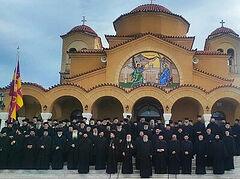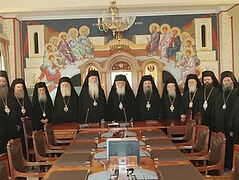Athens, December 21, 2023
The Holy Synod of the Church of Greece came out with a statement today addressing the ongoing scandal surrounding the possibility of legalized gay marriage in Greece.
A bill put forth by Greece’s New Democracy government is likely to come up for a vote early next year. The Sacred Community of the Holy Mountain issued its own statement a few days ago.
In its new statement, the Greek Synod explains that it is against all civil unions, even for heterosexual couples, because the Orthodox Church has its own “positive proposal for life, which is Christian marriage between a man and a woman.”
In particular, the hierarchs come out against the adoption of children by gay couples, as children need both a father and a mother. However, legalized gay marriage necessarily leads to legalized gay adoption, and therefore the state must not even start down this path, the Synod writes.
The Synod’s statement reads:
A. The Church of Greece’s View on Marriage
The Holy Synod of the Church of Greece does not specifically oppose the civil marriage of same-sex couples but opposes civil marriage in general. The Eastern Orthodox Church of Christ has its own positive proposal for life, which is Christian marriage between a man and a woman.
The Church considers the mental and physical union of man and woman as a sacred life choice that requires the blessing and Divine grace granted by the Lord Jesus Christ. From the Church’s perspective, marriage cannot be degraded to the level of a contract signed before a notary or a common declaration in front of the local municipality.
B. Position of the Church of Greece on Homosexual Tendencies and Acts
All people, despite their imperfections and weaknesses, are equally children and images of God. No one can be condemned for the characteristics and tendencies with which they were born. The Church is a family that does not reject any person for their weaknesses but encourages them to continually struggle to overcome them. However, thereafter, every man is free and therefore responsible if his choices, actions, and lifestyle lead him toward or away from God.
C. “Equality” in Marriage and Adoption (European Convention on Human Rights – EU Law)
To discuss the need for equal treatment or equality between heterosexual and homosexual couples in the right to marriage and adoption in Greece, there must have been a legally unjustified inequality that needs to be rectified. This is not the case.
The right to marriage in the European Convention on Human Rights (1950) was expressly provided only for male and female couples. A similar conclusion arises from the Greek Constitution (Article 21).
The jurisprudence of the European Court of Human Rights and the Court of Justice of the European Union has explained that European states are obliged to legislate for homosexual couples only alternative civil union institutions (such as the cohabitation agreement applicable in Greece) and: a) are not obliged to establish same-sex marriage or same-sex parenthood rights (adoption), b) nor are they obliged to equate alternative civil union institutions applicable to homosexual couples with marriage, c) if national legislation does not allow same-sex marriage and same-sex parenthood, the respective state has only an obligation to provide whatever documents are necessary to allow the entry and residence of homosexual couples – EU citizens (who have entered into same-sex marriage in another state) and any children they have adopted in other countries (freedom of movement and residence in the EU).
Furthermore, European states are not obliged to legislate marriage and adoption rights in favor of homosexual couples. The European Court has justified those states accused of not extending marriage and adoption to homosexual couples.
D. Cohabitation Agreement in Greece
Initially (2008), Greece legislated the cohabitation agreement as an alternative (to marriage) civil union institution only for heterosexual couples, excluding homosexual couples. As expected, Greece was condemned in 2013 by the European Court for unjustifiable discrimination against homosexual couples based on their sexual orientation. Subsequently (2015), due to the conviction, the Greek state was forced to extend the cohabitation agreement in favor of homosexual couples.
Now, the cohabitation agreement in Greece grants homosexual couples the same rights as marriage, with two exceptions: a) the right to register one party’s surname to the other party’s surname (after their agreement), b) the right to adoption. The Greek legislation on the cohabitation agreement for heterosexual and homosexual couples is in line with the country’s international obligations based on the European Convention on Human Rights and EU Law.
E. Infeasibility of Extending Marriage to Same-Sex Couples Without Adoption Rights
If marriage in favor of homosexual couples is legislated in Greece, excluding them from the right to adoption that currently applies to married (heterosexual) couples, Greece will follow a condemnation by the European Court of Human Rights due to adverse discrimination of the Greek legislation against married homosexual couples based on their sexual orientation.
Any government that extends marriage to homosexual couples, without the right to adoption that heterosexual spouses have, essentially transfers the political cost to the next government to extend adoption to same-sex spouses, after having caused the country’s condemnation by the European Court due to its flawed legislative policy (inadequate extension of marriage and the rights associated with it). It will repeat what happened in 2015, when the cohabitation agreement was extended to homosexual couples after the country was condemned by the European Court due to its inadequate legislation (2008) only in favor of heterosexual couples.
It is not by chance that all 201 of the 56 states in Europe that have included homosexual couples in the institution of marriage have not exempted them from the right to adoption, which is provided in their law in favor of married couples.
The pressure of “LGBTQ+” activist unions for the introduction of marriage in favor of homosexual couples mainly aims at the right of adoption, which is the main difference between marriage and the cohabitation agreement (which is provided for homosexual couples as well).
In surveys, the Greek public is misleadingly presented separately with: a) the question of extending civil marriage in favor of homosexual couples, and b) the question of adopting children by homosexual couples, while they cannot be legally treated as independent issues. In both questions, the public has a negative attitude, and with a large difference, especially on the issue of adoption. However, the establishment of two-tier marriage, with fewer rights for homosexual spouses than those for heterosexual spouses, is not legally permitted.
F. Position of the Church of Greece on Homosexual Parenthood
The position of the Church of Greece remains that children have an innate need and therefore the right to be raised by a male father and a female mother. No social modernization and no political correctness can deceive the natural need of children for a father and mother with substitute solutions, such as same-sex individuals impersonating parent A and parent B (two mothers, two fathers).
As the European Court of Human Rights has explained, with the institution of adoption, the state must provide a child with the appropriate family to raise them, not provide children to anyone who wants to become a parent. In the context of adoption, the interest of the child who is deprived of parents or suitable parents has priority, not the opinion of the adult who believes they are suitable as a parent.
In this context, it is legitimate for the state not to provide children for adoption to homosexual couples, since they objectively fail to transmit to children the paternal and maternal models and deviate from the biological and social roles of the two sexes.
The arguments that many heterosexual couples (natural parents) prove to be unsuitable as parents or that it is not preferable for orphaned children to grow up in institutions (so let them be given to homosexual couples) are absolutely nihilistic. In the context of the adoption institution, the state’s obligation is to find not the least bad, but the best solution for the healthy, normal development and social integration of children. Also, it should not be overlooked that in Greece there is an interest of heterosexual couples in adoptions, and that (not a few) heterosexual couples, due to the difficulties of adopting in our country, have resorted to the solution of adopting children in the territory of another state.
Finally: a) children should not be used as a tool for activist pressure, b) the democratic state is not obliged to succumb to personal demands of individuals with political power, economic prominence, or privileged access to the media, who believe they are entitled to raise a child with a partner of the same sex, overlooking the issue of whether their private life choices ensure the environment of models and roles that satisfy the needs of a child, c) the establishment of same-sex parenthood will facilitate phenomena of economic exploitation of women as surrogate mothers, d) children are neither companion pets for anyone who wants to feel like a guardian, nor “accessories” that will formalize or make a same-sex cohabitation socially acceptable.
Therefore, although there is no issue of disagreement specifically with civil marriage between individuals of the same sex, because civil marriage (regardless of the sex of the couples) is not of interest to Orthodox Christian tradition, the Church of Greece, because it has as a mission and the care for the proper upbringing of children and young people, disagrees:
-
with same-sex parenthood, because it does not satisfy the rights of children to have a father and mother
-
with same-sex marriage, because it leads to same-sex parenthood (it is not legally permissible to extend marriage to homosexual couples with exclusion from the right of adoption that currently applies to married couples).
Follow OrthoChristian on Twitter, Vkontakte, Telegram, WhatsApp, MeWe, and Gab!




